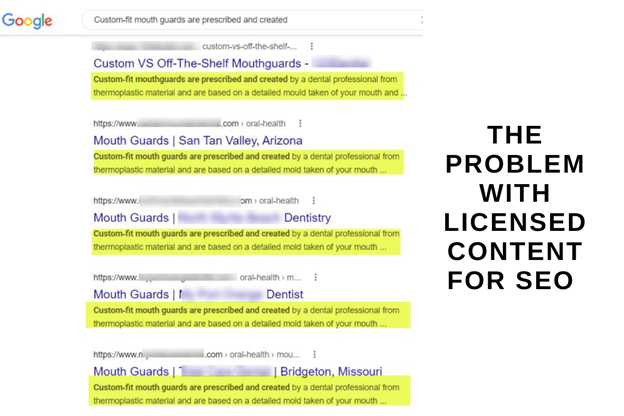Understanding the Potential Pitfalls of Licensed Content: SEO and Brand Distinction
As experts providing strategic consultation in SEO, content marketing, and digital strategy, we often find funny moments in the quirks and peculiarities that this industry presents. Allow me to share an example that you might find both scary and amusing.
 Try this simple experiment: Type this phrase into your Google search bar: “custom-fit mouth guards are prescribed and created”. After a lengthy scroll through approximately 25 pages of search results, you might finally come across a unique piece of content. It is immediately apparent that this single blog post that originally appeared on a third-party site has been widely distributed for use by dental practices everywhere.
Try this simple experiment: Type this phrase into your Google search bar: “custom-fit mouth guards are prescribed and created”. After a lengthy scroll through approximately 25 pages of search results, you might finally come across a unique piece of content. It is immediately apparent that this single blog post that originally appeared on a third-party site has been widely distributed for use by dental practices everywhere.
This leads us to an important question – is your content marketing strategy built around syndicating existing content sourced from third parties or syndication partners? If the answer is yes, were you informed that these types of content syndication services are not likely to contribute positively to your site’s search engine optimization (SEO)?
Skepticism and Licensed Content: The Dilemma of Duplicate Content
There are good reasons for this skepticism. After all, how can your website distinguish itself and improve its rank on search engines when you don’t create content but, rather, feature the exact same online content that users can find on 249 other sites across your industry?
That said, it’s important to acknowledge that content syndication isn’t completely without merits.
The Positive Aspects of Syndicating Content
Content syndication can provide value to your target audience. For example, visitors to a dental website who are there to book an appointment or find a location might appreciate a syndicated article on mouth guards. Those types of service-oriented site visitors simply may not care whether you syndicate your content or publish content you had no hand in creating.
It can also serve as a time and resource saver. Not every dental practice, or any business for that matter, has the luxury of having a dedicated content creator on staff. In these cases, using a content syndication strategy allows you to share relevant information, even if it is the same content that can also be found on another third-party website, without having to deal with the challenges of creating your own content.
Further, web content syndication can offer insights into your audience’s preferences. Analyzing how syndicated content performs on your own blog can provide useful data about what your target audience wants – do they prefer visual content or text-based content? Do they favor quick tips and brief blog posts or are they more interested in reading an entire article of detailed information? What content formats work best? This knowledge can assist in refining your go-forward content strategy.
Where Licensed Content Falls Short: Search Engine Rankings and Brand Uniqueness
The limitations of licensed content become apparent when considering search engine rankings and establishing your own unique brand identity. When you syndicate content on your own site that can also be seen on hundreds of other syndication network partner sites, it runs the risk of becoming lost in the “sea of sameness,” offering little value to your brand and failing to boost your visibility on search engine results pages.
A Recommended Approach: Strategic Use of Content Syndication and Emphasizing Original Content
Our recommendation? Use content syndication in a judicious manner if you must, but focus your energy on building original content that highlights your brand’s unique expertise. Your audience is interested in your brand’s unique perspective and knowledge, not blog posts or syndicated content that they can find on any number of other sites. Buying content usage rights from a content syndication network doesn’t satisfy this need.
The Importance of Digital Differentiation: Embrace Originality and Quality Content
In an era where digital differentiation holds the key, we encourage businesses to invest more time and resources into creating and optimizing valuable content for their websites. It’s not merely about adding content, but about creating content that communicates a message that’s uniquely yours. A commitment to originality, to content that was originally published on your site, could very well be the differentiator that sets your brand apart in the digital world.
Navigating the Intricacies of Content Marketing: Beyond Syndication
The world of content marketing is not without its complexities. While content syndication networks offer considerable benefits, a heavy reliance on them might be a pathway to unforeseen obstacles.
The Pitfalls of Duplicate Content
At first glance, content syndication from third-party sites might appear to be a pragmatic strategy. However, it could inadvertently lead to a surge in duplicate content on your site. Search engines like Google are designed to prioritize unique and relevant information, and they may penalize websites that host duplicate content. Consequently, your hopes of sustained traffic to your site might be detrimentally impacted.
The Quest for Originality: More than a Buzzword
The blog post that originally appeared on your site, regardless of its relevance and quality, is tarnished when it’s duplicated across multiple publications. It’s no longer your unique content; it becomes just another drop in the vast internet ocean. This dilution of uniqueness could diminish your own blog’s perceived value, potentially affecting both readership and search engine rankings.
The Indispensable Role of Original Content Creation
Original content creation serves more than just evading search engine penalties. It’s about offering substantial value to your audience and fostering your brand’s reputation.
Carving Out a Unique Brand Voice
By focusing on content that was originally published on your site, you cultivate a unique brand voice. This unique voice distinguishes you from competitors and helps your brand resonate deeply with your audience.
Building Credibility and Trustworthiness
Original, relevant content positions your brand as an authority in your industry. This perceived authority can elevate trust among your audience, leading to improved engagement, customer loyalty, and, over time, consistent traffic to your site.
Striking the Perfect Balance: Content Syndication and Original Content Creation
In a digital landscape that’s continuously evolving, it’s vital for content marketers to strike a good balance between content syndication efforts and creating original content. By judiciously employing syndicated posts from third-party sites and social media platforms, along with generating original content, you can optimize the reach and impact of your content marketing efforts.
Curating Valuable Syndicated Content
Remember, all syndicated content isn’t created equal. It’s imperative to select content that aligns with your audience’s interests and resonates with your brand’s values. The syndicated post should offer value to your readers, not merely serve as a filler on your site.
Prioritizing Original Content Creation
While maintaining a balance with syndicated content, it’s essential to dedicate substantial time and resources to original content creation. This not only bolsters your site’s SEO performance but also helps in shaping a unique brand identity that connects with your target audience.
In conclusion, it’s crucial to appreciate that while paid content syndication can have its merits, an exclusive reliance on it might not yield the results you want for your brand. As strategic advisors, we recommend a measured approach – leverage content syndication strategically while channeling significant efforts into creating and optimizing original content that truly reflects your brand’s unique expertise and viewpoint. This balanced approach can pave the way for your brand to stand out and achieve enduring success in the increasingly competitive digital arena.





